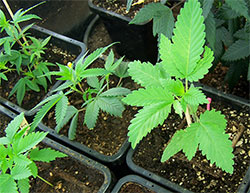
|

|

|

|
Holi Moli - An American Seed Co.
Best Soil for Cannabis |
||
Best Soil for Cannabis PlantsWhen it comes to successfully growing cannabis, one of the most critical factors to consider is the soil. The right soil composition and conditions can significantly impact the health, growth, and overall productivity of cannabis plants. Understanding the specific soil requirements for cannabis cultivation is essential for both beginners and experienced growers alike. In this article, we will explore the various aspects of cannabis soil, including its composition, pH levels, drainage, and nutrient content. We will also delve into different types of soils, organic and sustainable practices, soil testing and monitoring, and troubleshooting common soil problems. By the end, you will have a comprehensive understanding of the best soil practices for growing cannabis, ensuring optimal results in your cultivation endeavors. |
||
Best Soil for Cannabis GrowingThe Importance of Soil in Cannabis Cultivation
Growing plants in soil:
Essential Factors to Consider for Cannabis SoilWhen selecting soil for cannabis, there are a few key factors to consider. First and foremost, you want soil that has good drainage. Cannabis plants don't like to have their roots sitting in water, so soil that holds moisture without becoming waterlogged is ideal. Additionally, the soil should be well aerated, allowing for oxygen to reach the roots. Finally, the soil should be rich in nutrients to support healthy plant growth. Understanding Soil Composition and pH for Successful Cannabis GrowthThe Basics of Soil Composition for CannabisSoil composition refers to the types and ratios of different components in the soil. For cannabis, a blend of organic matter, such as compost or manure, with inorganic materials like perlite is commonly used. This mixture provides a balance of nutrients, water retention, and drainage. pH Levels and Their Impact on Cannabis GrowthpH levels play a crucial role in cannabis cultivation. Cannabis plants prefer slightly acidic soil, with a pH range of 6.0 to 6.8. pH affects nutrient availability to the plants, so it's important to monitor and adjust the pH of your soil accordingly. Evaluating Different Types of Soil for Growing CannabisSoil Types Suitable for Cannabis Growth
Methods and techniques involved in growing plants in soil:
The right techniques depend on the plants being grown, space constraints, soil needs, and desired management intensity. Most soil gardens use a combination of these methods. Pros and Cons of Various Soil TypesSandy loam soils are well-draining but may require more frequent watering. Clay loam soils retain moisture well but can become compacted. Peat-based soils have excellent water-holding capacity but may need additional amendments for proper aeration. Each soil type has its pros and cons, so it's important to choose one that aligns with your specific growing conditions and preferences.
|
||
Nutrient-rich Soil Amendments for Optimal Cannabis Growth |
Essential Nutrients for Cannabis PlantsCannabis plants require a range of essential nutrients for healthy growth. These include macronutrients like nitrogen, phosphorus, and potassium, as well as micronutrients like iron, manganese, and zinc. Providing these nutrients in the right proportions is crucial for optimal cannabis growth. Organic and Synthetic Soil Amendments for CannabisTo enhance the nutrient content of your soil, you can use organic or synthetic soil amendments. Organic amendments, such as compost or worm castings, improve soil structure and fertility naturally. Synthetic fertilizers, on the other hand, provide precise nutrient ratios but may lack the long-term benefits of organic amendments. The choice between organic and synthetic amendments depends on your personal preferences and growing philosophy. |
|
Remember, finding the best soil for growing cannabis is about creating the ideal environment for your plants. By considering soil composition, pH levels, soil types, and nutrient amendments, you'll be well on your way to successful cannabis cultivation. Happy growing, and may your green thumb flourish! Implementing Proper Drainage and Moisture Retention in Cannabis SoilImportance of Good Drainage in Cannabis SoilWhen it comes to growing cannabis, good drainage is key. Just like humans, plants don't like having wet feet! Proper drainage allows excess water to flow out of the soil, preventing root rot and other moisture-related issues. So, how can you ensure your cannabis soil has good drainage? Techniques for Improving Moisture Retention in Cannabis Soil On the flip side, you also want to make sure your cannabis plants have enough moisture for healthy growth. Finding the right balance can be a challenge, but fear not! There are techniques you can employ to improve moisture retention in your cannabis soil. We'll dive into these methods to help you keep your plants happy and hydrated. Choosing Organic and Sustainable Soil Practices for Growing CannabisBenefits of Organic Soil PracticesOrganic soil practices have gained popularity in recent years, and for good reason. By using organic materials and natural fertilizers, you can create a healthier and more sustainable growing environment for your cannabis plants. This section will explore the benefits of going organic and how it can improve the quality of your harvest. Sustainable Soil Management Techniques for CannabisSustainability isn't just a buzzword—it's an essential aspect of responsible cannabis cultivation. In this section, we'll discuss various soil management techniques that promote sustainability. From composting to cover cropping, there are plenty of ways to minimize waste, conserve resources, and keep your cannabis garden eco-friendly.
|
||
Soil Testing and Monitoring for Cannabis Health and ProductivityImportance of Regular Soil TestingSoil testing may not sound glamorous, but it's a vital step in ensuring the health and productivity of your cannabis plants. By analyzing the composition of your soil, you can pinpoint nutrient deficiencies, pH imbalances, and other factors that may affect plant growth. Regular soil testing saves you time, money, and frustration in the long run. Monitoring Soil Moisture, pH, and Nutrient LevelsTesting is just one part of the equation. Monitoring your soil's moisture, pH, and nutrient levels on an ongoing basis allows you to make necessary adjustments and keep your cannabis plants thriving. In this section, we'll discuss the importance of monitoring and provide practical tips on how to do it effectively. |

|
|
Common Soil Problems and Troubleshooting Tips for Cannabis GrowersIdentifying and Addressing Soil Nutrient DeficienciesEven with all the best practices in place, soil nutrient deficiencies can still arise. It's important to be able to identify these issues and take prompt action to correct them. In this section, we'll cover common nutrient deficiencies in cannabis plants and share some handy tips for addressing them. Dealing with Pests and Diseases in Soil for Growing CannabisPests and diseases are the bane of every cannabis grower's existence. But fear not, intrepid cultivator! We're here to help you tackle these soil-related challenges head-on. From pesky insects to sneaky fungi, we'll provide you with practical advice on how to combat soil pests and diseases and keep your cannabis garden healthy and pest-free. By implementing proper soil practices in your cannabis cultivation, you can greatly enhance the health and productivity of your plants. Understanding the importance of soil composition, pH levels, nutrient amendments, and moisture retention will enable you to create an ideal growing environment. Regular soil testing and monitoring, along with addressing common soil problems, will help you overcome challenges and ensure successful cannabis growth. With the knowledge gained from this article, you are equipped to cultivate thriving cannabis plants and achieve the best possible results in your gardening endeavors. |
||
FAQDoes the type of soil really matter for growing cannabis?Yes, the type of soil plays a crucial role in the growth and health of cannabis plants. Different soil types have varying levels of drainage, moisture retention, and nutrient content. Choosing the right soil type based on the specific needs of cannabis plants can significantly impact their overall development and yield. Can I reuse soil from a previous cannabis grow?Reusing soil from a previous cannabis grow is possible, but it requires proper preparation and consideration. It is essential to assess the condition of the soil, amend it with necessary nutrients, and ensure it is free from pests or diseases. Additionally, mixing the old soil with new soil or compost can help replenish its nutrient content and improve its structure for the next cultivation cycle. How often should I test my cannabis soil?Regular soil testing is crucial for maintaining optimal soil conditions for cannabis growth. It is recommended to test the soil before each new growing season or crop cycle and periodically throughout the cultivation process. This allows you to monitor the pH levels, nutrient content, and any potential imbalances that may affect the health and productivity of your cannabis plants. What are some natural remedies for common soil problems in cannabis cultivation?For common soil problems like nutrient deficiencies or pH imbalances, utilizing organic remedies is often preferred in cannabis cultivation. Natural solutions such as compost tea, organic fertilizers, or amendments like bone meal or kelp can help replenish nutrient levels and adjust pH. Additionally, implementing crop rotation, beneficial microbial inoculants, or cover crops can assist in preventing soil-borne diseases and maintaining soil health. |
||
|
||||||||||
Categories: Cannabis Seeds Worldwide Root, Cannabis Seeds, USA, Medicinal Seeds, Strains, Symptoms, High CBD Seeds, Photoperiod Seeds, Insomnia, Migraine, Feminized Seeds, Pain, Chronic Fatigue, Arthritis, Anxiety, Stress, Fibromyalgia, Glaucoma, Depression, Conditions, Best Sellers, California, Beginner Seeds, Indoor Seeds, HoliMoli Seed Bank, Seed Bank.